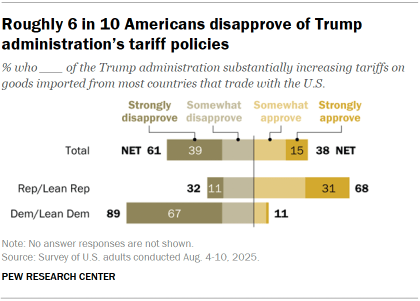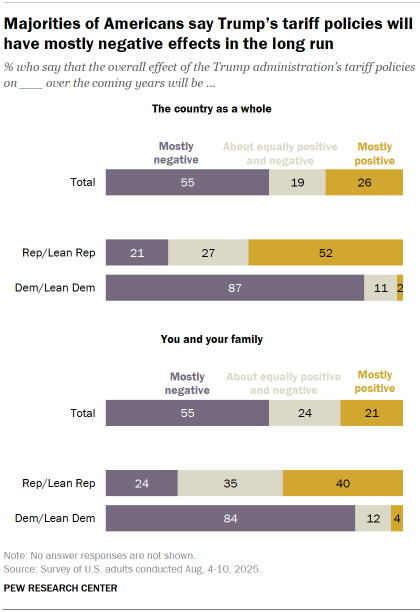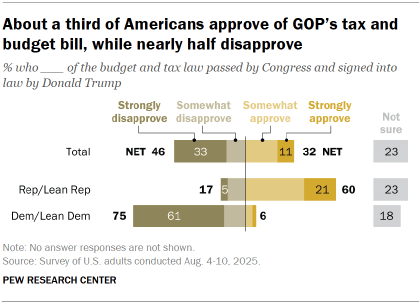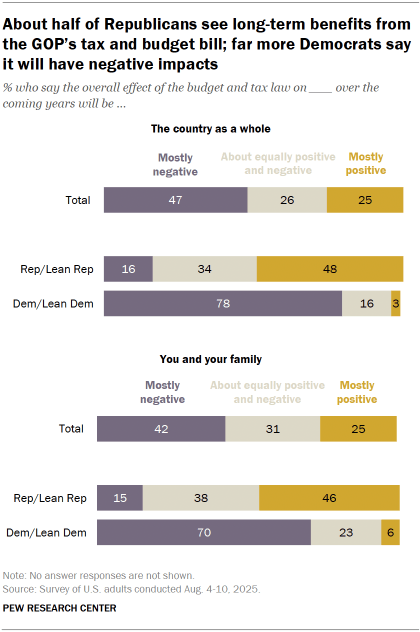Over the past several months, the Trump administration has implemented key aspects of its economic policies by raising tariffs on nearly all U.S. trading partners and winning final congressional passage of its sweeping tax and budget bill, officially titled the “One Big Beautiful Bill Act.”

The public’s views on these policies remain more negative than positive.
A 61% majority of Americans disapprove of the Trump administration increasing tariffs on goods imported from most countries that trade with the United States, while 38% approve. These views are largely unchanged since April, shortly after Trump unveiled his far-reaching tariffs policy.
Note: This survey was in the field on Aug. 7, when the Trump administration imposed higher import taxes on scores of countries, including tariffs as high as 50% for some countries.
By a wide margin, Republicans approve of the administration’s tariff and trade policies while Democrats overwhelmingly disapprove:
- 68% of Republicans and Republican-leaning independents approve of the increased tariffs.
- 89% of Democrats and Democratic leaners disapprove.
Americans continue to express more negative than positive views of the GOP’s tax and budget legislation, which Trump signed into law on July 4. Only about a third (32%) approve of the legislation, while 46% disapprove. And by wide margins, more say the long-term effects of the legislation will be negative rather than positive.
View of Trump’s handling of the economy also remain negative. A 55% majority say they are not too confident or not at all confident in Trump’s ability to make good decisions on economic policy, which is virtually unchanged from April.
How will the Trump administration’s tariff policies impact the country and Americans personally?
Majorities of Americans say the long-term effects of the administration’s tariff policies will be mostly negative for the country (55%) and for themselves and their families (also 55%).

While there are partisan differences in these views, Republicans express mixed views of the impacts of the tariffs, while Democrats are largely negative.
The country as a whole
More than twice as many Americans say the tariffs will have mostly negative effects on the country in coming years (55%) as say the effects will be mostly positive (26%). About one-in-five (19%) expect the effects will be about equally positive and negative.
About half of Republicans and GOP leaners (52%) anticipate that the tariffs will benefit the country in the long term, while 27% see mixed positive and negative effects; 21% expect the tariffs to negatively affect the country in coming years.
By comparison, nearly nine-in-ten Democrats and Democratic leaners (87%) say the tariffs will have negative effects on the country in coming years.
Americans and their families
When asked about the effect of such policies on them and their families, overall views are similar: 55% of adults say they expect the personal impact to be mostly negative in coming years, while 21% say it will be mostly positive. Roughly a quarter say the effect will be about equally positive and negative.
Notably, Republicans are less likely to say the tariffs will have mostly positive effects on themselves and their families (40%) than on the country (52%) in the coming years. They are somewhat more likely to say the personal impact will be mixed (35%, compared with 27% who say this about the country).
Democrats, by contrast, are nearly as skeptical of the long-term personal impact of the tariffs (84% say it will be mostly negative) as they are of their effect on the country (87%).
More Americans disapprove than approve of GOP’s tax and budget law
Just over a month since being passed into law, the GOP’s “One Big Beautiful Bill” continues to be viewed more negatively than positively: 46% of Americans disapprove of the law, while 32% approve. Another 23% are not sure.

These views have changed little since June, prior to the passing of the bill by the Senate, when 49% of adults said they opposed the budget and tax bill proposed by Trump and Republicans in Congress and 29% favored it.
There continue to be wide partisan differences in views of the legislation:
- Six-in-ten Republicans say they approve of the budget and tax law, while 17% disapprove and 23% are not sure.
- Democrats disapprove of the law by an overwhelming margin (75% to 6%), with 18% not sure.
Democratic opposition to the law is far more intense than Republican support for it. While 61% of Democrats strongly disapprove of the measure, just 21% of Republicans strongly approve.
Overall, far more Americans say the tax and budget law will have mostly negative effects than mostly positive effects.

Nearly half (47%) say the law will have a mostly negative effect on the country in coming years, while 25% expect mostly positive effects. About a quarter (26%) say the results will be mixed.
Views are fairly similar regarding the law’s personal impact.
As with overall opinions about the law, negative opinions about the effects of the law among Democrats far surpass positive views among Republicans.
About eight-in-ten Democrats (78%) say the law’s effect on the country over the coming years will be mostly negative. A smaller share of Republicans (48%) say it will have a mostly positive impact.
Partisans are similarly divided when it comes to the effect of the budget and tax law on them and their families: Seven-in-ten Democrats say the impact of the law will be mostly negative on them and their families, and 46% of Republicans say it will be mostly positive.




